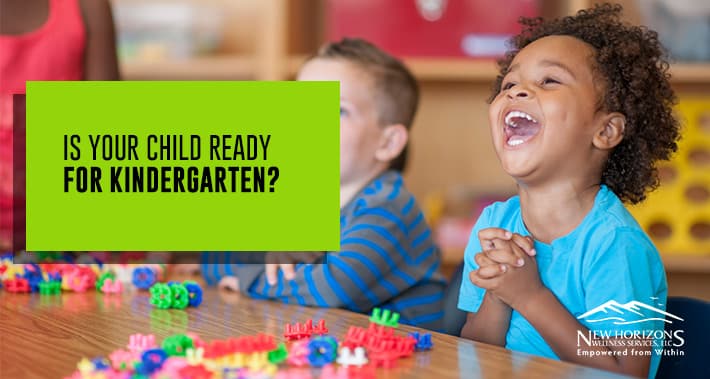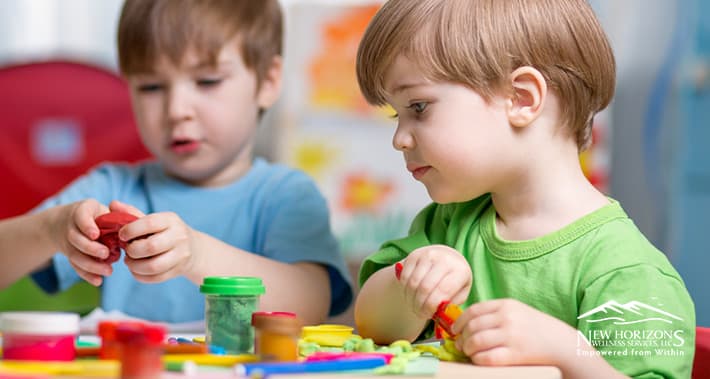
Obviously this school year is going to be a little different than we’re used to.
As challenging as the added stress is due to COVID-19, though, there are certain things that never change.
When a child approaches preschool age, there are certain benchmarks we use to measure their progress and preparedness.
These benchmarks take into consideration the average level of development expected for a child at preschool age.
Here at New Horizons Wellness Services, we’re often asked about what skills and behaviors are needed for a child to be successful in kindergarten – which is what you’ll find below.
If your child is falling behind, occupational therapy for kids can help.
Keep reading to find out how.
Every Child Is Different, But…
Yes, it’s true that every child progresses at different rates.
If you have more than one child, or know anyone with a similarly aged child to yours, this is obvious.
It’s expected, for example, that a child will say their first word around 12 months of age.
Your child might say it a couple of months sooner or later though, and that’s not generally cause for concern.
They’ll likely take their first steps around the same time as well – again, a couple months later isn’t cause for concern, nor is a couple months sooner a sign your baby is going to be an Olympic athlete.
However, there are certain milestones your child ought to be reaching.
If they can’t walk or say a dozen or so words by 18 months, for example, it may be indicative of a larger issue.
What Skills Does Your Child Need For Kindergarten?
By now, you might have a list of supplies your child will need once they take their first steps through the door of their kindergarten classroom or when they have their first day of on-line learning.
Beyond supplies, though, what are the skills your child will need to be able to thrive in their new environment?
In Lisa Stark’s article “Practicing Kindergarten, she notes that in Illinois, only one in four kindergarteners was performing at the level they were expected in three key areas – language & literacy skills, math, and social/emotional development.
When it came to children from low income families, the stats were even worse – only 16% were prepared for kindergarten.
You might not be in Illinois, but there’s no reason to believe the data would be drastically different here in Oregon.
So what are the criteria by which we measure a child’s preparedness for kindergarten?
And how does your child measure up?
Keep reading.
The Kindergarten Readiness Checklist
How do you know if your child is on target for these skills?
The occupational therapy, psychology, and speech language pathology providers at New Horizons Wellness Services created a checklist for you to use as a guide to identify what skills educators look for in these specific areas.
This checklist is also helpful for you to use to monitor the development of your preschooler’s skills.
If you’re concerned about your child’s progress and preparedness for kindergarten, you might consider speaking with an occupational therapist here at New Horizons Wellness Services.
Though you may not think of it this way, your child does have occupations.
Maybe not in an income-based way like most adults do, but they do have activities that occupy their time.
This includes playing, learning, and exploring – and soon it will include being a student as well.
If you find areas of concern after completing the checklist, contact NHWS for a phone consultation to find out how occupational therapy or speech therapy can help prepare your child for kindergarten.
In addition, diagnostic evaluations can help to clarify why your child may be struggling.
This can help when making plans for what types of interventions will help your child the most.

1. Personal-Social Development
This has to do with how your child behaves in social situations, and how self-sufficient they are.
If your child is prepared for kindergarten, they should be able to:
- Do things for themselves (put toys and belongings away)
- Dress themselves using zippers, buttons, and other fasteners.
- Take their coat on/off and hang it up
- Attempt to tie own shoes
- Open their backpack and take items in and out
- Use the bathroom, flush and wash hands
- Eat a variety of healthy foods
- Follow classroom rules and routines
- Problem solve when angry
- Take turns and share
- Stay on task with distractions present
- Show persistence and stay with an activity to completion
- Transition between tasks when asked
- Interact appropriately with peers and have friends
2. Physical Development
This has to do with your child’s gross motor skills – those requiring larger muscles and broader movements – and fine motor skills – those requiring smaller muscles for more precision movements.
By the time your child is beginning kindergarten, they ought to be able to:
- Gallop and skip
- Walk up and down stairs, alternating feet
- Enjoy outdoor play such as running, jumping, and climbing
- Catch, throw, bounce a ball
- Pedal and steer a trike
- Cut with some accuracy around objects
- Hold a crayon or marker correctly
- Sit on floor with legs crossed to listen to a story
3. Understanding And Using Language
There are many different things that separate us from animals, but if you were to choose one thing, it might be our ability to use language to communicate.
Naturally, we don’t come out of the womb with the ability to use language – it’s something we pick up during our formative years.
If your child is preparing for kindergarten, they ought to be able to:
- Use 4-5 word sentences to express their needs and wants
- Use regular past tense verbs that end with “ed” (e.g., played)
- Use & understand descriptive/comparative words (e.g.,“That’s a tall red building” “the blue building is taller”)
- Talk about everyday experiences
- Participate in conversation with adults and peers
- Ask questions about things around him/her
- Answer wh-questions (who, what, when, where, why)
- Tell or retell what happens in stories
- Sing and/or recite nursery rhymes
- Communicate in a way that you can understand them
- Pronounce all the sounds necessary for creating English words
- Follow 3-step directions
- Understand concepts such as in/out, over/under, on/off, front/back
- Recognize and name colors
- Sort/categorize items by color and/or shape (other characteristics)
4. Cognitive Development & Pre-Academic Skills
This section has to do with your child’s ability to remember facts, think abstractly, and have a foundation for the skills they’ll build in school.
Your child should be able to:
- Demonstrate curiosity, persistence, and exploratory behavior
- Know their full name, parents names, address, phone
- Count to 10 (and beyond?)
- Draw a picture of a person
- Write their own name and other letters and/or numbers
- Sit at a table/desk for up to 15 minutes at a time
- Ask about words/ask you to write/read things
- Looks at books on their own and/or ask to be read to
- Recognize their own name in print
- Pretend to read books by “reading” the pictures
Book An Appointment At New Horizons Wellness Services
Having read the above signs, are you concerned about your child’s ability to thrive in kindergarten?
If so, there is hope.
Contact us at New Horizons Wellness Services to book your appointment today.
Yours in Health,
New Horizons Wellness Services13333 SW 68th Pkwy,
Tigard, OR 97223
- https://g.page/newhws
New Horizons Wellness Services provides a true multidisciplinary approach to mental & physical health treatments for children, adults and families.
